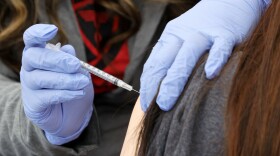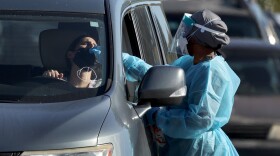COVID-19 hospitalizations in the Austin area have risen above the threshold for Stage 5, the highest level, of Austin Public Health’s coronavirus risk guidance.
The highly transmissible omicron variant and increased gatherings and travel during the holidays have spurred a surge in new infections. APH is keeping Austin in Stage 4 for now, but says Stage 5 is "imminent without demonstrative behavior changes."
“We are working towards a community-driven effort to stop the spread of this virus,” Austin-Travis County Health Authority Dr. Desmar Walkes told Travis County Commissioners and the Austin City Council on Tuesday. “If we work together to do that, we can accomplish it because we’ve done it before.”
The Austin area moved to Stage 4 last week. In this stage, APH recommends vaccinated people wear masks at indoor and outdoor gatherings with people outside their households, and while traveling, shopping and dining. People who are unvaccinated, partially vaccinated or still need a booster shot are urged not to gather with people they don't live with, to travel and shop only if essential, and to use takeout and curbside dining services.
APH said in a press release Tuesday that data shows about 1 in 3 COVID-19 tests are coming back positive in Central Texas. The health agency said 30% of tests APH and its regional partners administered last week were positive for COVID-19. The community transmission rate — the number of new cases per 100,000 people in the past seven days — is 452, which exceeds the statewide average.
Walkes said the omicron variant makes up more than 80% of COVID-19 cases in the community. More than 1,000 new coronavirus infections and 59 new COVID-19 hospitalizations were reported in the area on Monday. The seven-day average for new COVID-19 hospitalizations jumped to about 66 on Monday, up from 28 a week earlier.
“We are counting those people who are admitted for COVID-related illness and those people who are admitted for other illness who happen to test positive,” Walkes said.
This method of tallying hospital admissions has been used throughout the pandemic, according to Walkes, and she says hospitals are seeing more of the latter during this surge.
There’s been a small increase in the number of people hospitalized with COVID who have been vaccinated. Walkes said 20% of the 375 people hospitalized for COVID-19 between Dec. 27 and Jan. 2 were fully vaccinated with an additional dose.
Unvaccinated patients who reported their vaccination status make up about 50% of current hospitalizations in the area, down from about 60% to 70% pre-omicron.
Adrienne Sturrup, the health agency's interim director, said APH continues to see increased demand for testing after the holidays and ahead of the return to classrooms for students, teachers and staff. Austin Independent School District resumes in-person classes on Wednesday.
“If you traveled or if you were with family and friends or you think you were exposed, we want you to get tested,” Sturrup said.
Austin Public Health is currently operating two COVID-19 testing sites, one at Dove Springs Recreation Center and another at the Travis County Expo Center. People can make an appointment or show up without one. Find hours of operation and make an appointment here.
Other sites around Austin, like pharmacies, clinics and local health centers, also offer testing.













